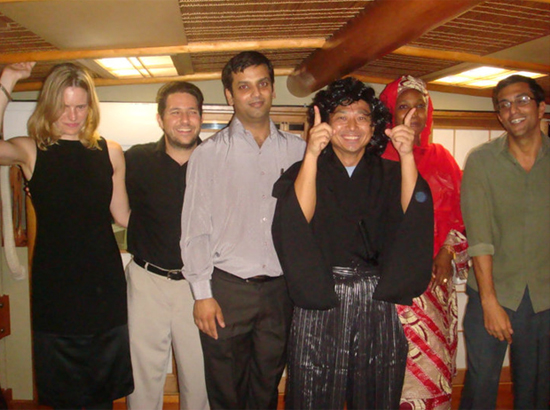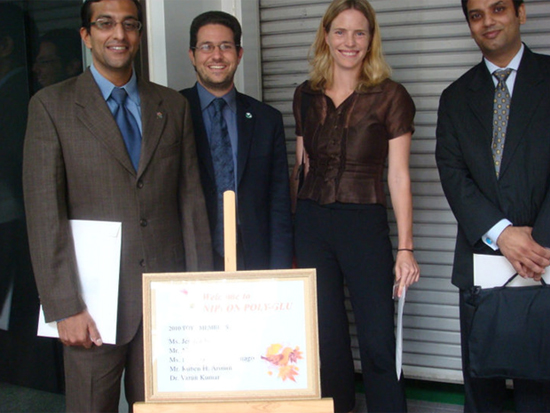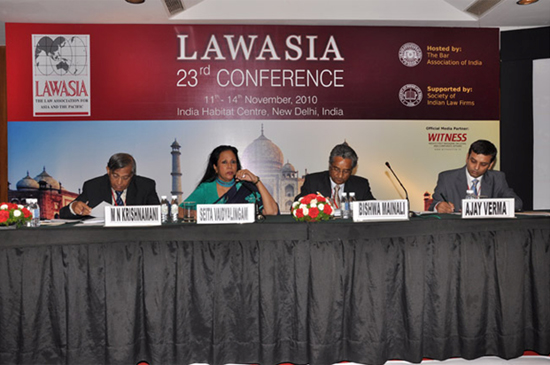
In the last four months of 2010, IBJ Fellow Ajay Verma was honored on two separate occasions for his vital work in India. An international youth leadership award was granted to Ajay in recognition of his success in leading IBJ’s programs in India, and an international legal conference invited Ajay to participate in a panel discussion of legal aid and pro bono practice in India. Both events provided valuable opportunities for Ajay to spread the word about IBJ’s critical mission, both in India and worldwide.
In September, Ajay was selected by the Junior Chamber International (JCI) Osaka to be one of its “Outstanding Young Persons.” JCI Osaka is a member organization of Junior Chamber International, a worldwide organization consisting of young professionals and entrepreneurs between the ages of 25 and 40. The Outstanding Young Persons (TOYP) program invites young, outstanding leaders from around the world to take part in a forum to encourage mutual understanding and communication among different countries. Other honorees included an American who coordinates efforts to combat poverty and hunger in India, a communications director from Global Green, a Nigerian working on hunger relief, and a doctor from a Cambodian children’s hospital. These honorees were introduced and welcomed to Japan to inspire the youth in Osaka to pursue similar paths in social entrepreneurship and to strive to make positive changes in the world.
JCI Osaka recognized Ajay’s work as a lawyer for the poor and acknowledged his efforts with IBJ to strengthen India’s criminal justice system. Before more than 1,000 guests, Ajay was given the opportunity to share his thoughts about legal aid, IBJ’s mission, and the importance of treating the entire global community as a family. As part of the program, honorees were introduced to the culture and business of Japan through social activities and tours. Dignitaries also attended the ceremony to celebrate the success of the honorees, including the U.S. consul, corporate leaders, and the Crown Prince of Japan.

2010 Outstanding Young Persons (TOYP) of JCI Osaka (from left, Dr. Varun Kumar, Ruben Aronin from Global Green, Jessica Mayberry from Video Volunteers, and Ajay Verma of IBJ India).
Gaining recognition as an outstanding young leader not only bolsters Ajay’s successes with IBJ India, but also exposes young, motivated individuals in Japan to learn about IBJ’s global mission and the importance of strengthening criminal justice infrastructure and spreading the rule of law around the world.
In November, Ajay was invited to speak at the 23rd Conference of Lawasia. Lawasia is an international organization of lawyers’ associations, individual lawyers, judges, and legal academics who focus on the interests and concerns of the legal profession in the Asia Pacific region. The conference spanned four days, and included substantive seminars on specific areas of law (such as consumer protection, or international law) as well as a wealth of networking opportunities. Attendees included leading advocates from around the world, including India, Canada, Japan, Australia, Malaysia, and Singapore. Distinguished jurists and government officials from India also attended, including former Supreme Court Judge the Honorable Mr. Justice VR Krishna Iyer and Honorable Mr. Justice AK Sikri of the Delhi High Court.

Panelists at the working session on Legal Aid & Pro-Bono: Current Trends (from left: Mr. M.N. Krishnamani, Senior Advocate, Supreme Court of India; Ms. Seita Vaidyalingam, Advocate; Mr. Bishwa Mainali, Senior Advocate, Supreme Court of Nepal; and Ajay Verma, Advocate & IBJ India Fellow).
Ajay was invited to speak about legal aid and pro bono practice in India. Ajay took the opportunity to tell those in attendance how legal aid practice works in India, and how IBJ India endeavors to improve that practice. Ajay highlighted IBJ’s international training conference, held in New Delhi in 2008, and the numerous regional training conferences and panels held around the country since then. Additionally, Ajay discussed the challenges facing legal aid in India, including the need for sensitization of the judiciary and better training for defense lawyers. Finally, Ajay concluded with a powerful message to inspire the private sector participants to join in the effort to deliver effective legal representation to indigent criminal defendants in India. Participants who attended the panel left the event better informed about IBJ India’s role in building a sustainable infrastructure for legal aid in the country, and how those efforts fit into the global movement to guarantee basic rights to the accused.